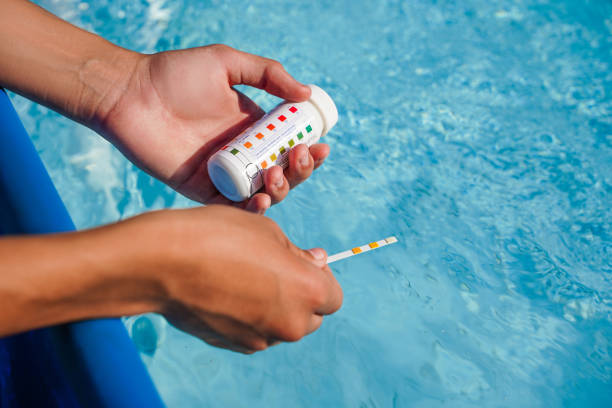
Owning a pool, whether for residential or commercial use, comes with its share of responsibilities. Ensuring crystal-clear, safe, and inviting water for swimmers requires diligent maintenance.
One crucial aspect of pool care is maintaining the pool’s alkalinity, which contributes significantly to water balance.
In this guide, we will explore the importance of maintaining proper alkalinity in pool maintenance, factors that affect pool alkalinity, and how a pool alkalinity increaser can help ensure water balance.
Pool alkalinity, often referred to as total alkalinity, is a fundamental water quality parameter in swimming pools. It represents the pool water’s ability to resist changes in pH levels. It acts as a pH buffer, helping to keep the water’s acidity or basicity in check.
Imagine alkalinity as a safety net for your pool’s pH. When pH levels try to go on a rollercoaster ride becoming too acidic or too basic, pool alkalinity steps in to stabilise things.
Both residential and commercial pool owners benefit significantly from maintaining proper alkalinity:
Proper alkalinity levels create a more comfortable and safer swimming environment. When alkalinity is within the recommended range, swimmers experience fewer irritations to their eyes and skin.
Balancing alkalinity effectively reduces the need for frequent chemical adjustments. Pool owners can expect fewer chemical additions to maintain the desired water quality. This translates to cost savings on chemicals and less time spent on pool maintenance tasks.
This stability reduces the need for frequent chemical adjustments to correct imbalances. A well-balanced pool requires fewer chemicals to maintain, resulting in a more stable and consistent water environment.
Commercial pools are subject to strict health regulations and inspections. Adequate alkalinity ensures efficient sanitation by allowing chlorine or other sanitisers to work effectively. Maintaining compliance with health regulations is not only a legal requirement but also vital for ensuring the well-being of pool users.
Various factors influence pool alkalinity, impacting both residential and commercial settings. Understanding these factors is essential for maintaining optimal alkalinity levels.
pH levels and alkalinity are closely linked. A low pH can lead to reduced alkalinity, while high pH levels can cause alkalinity to rise. Pool owners must monitor both parameters to maintain water balance effectively.
Environmental factors, such as weather and climate, can affect alkalinity. For instance, heavy rainfall can dilute pool water and lower alkalinity. Additionally, frequent pool usage can lead to changes in alkalinity.
Commercial pool owners face distinct challenges in maintaining alkalinity. Higher bather loads, health regulations, and the need for constant water quality monitoring make alkalinity management a priority.
Imbalanced alkalinity can result in water quality issues:
Pool alkalinity increaser, also known as sodium bicarbonate or sodium hydrogen carbonate, is a chemical compound that plays a crucial role in maintaining the proper alkalinity levels in your pool water.
Here’s how it works:
Maintaining proper alkalinity in your pool is essential for achieving optimal pool maintenance. Whether you own a residential or commercial pool, the benefits of balanced alkalinity are undeniable.
Enhanced water clarity, comfort, and safety, as well as equipment preservation, make it a top priority for pool owners.
Explore our product page for pool alkalinity increaser, a reliable solution that increases pH and maintains alkalinity levels.
For personalised assistance and expert guidance, contact us today and ensure your pool’s alkalinity is in perfect balance!